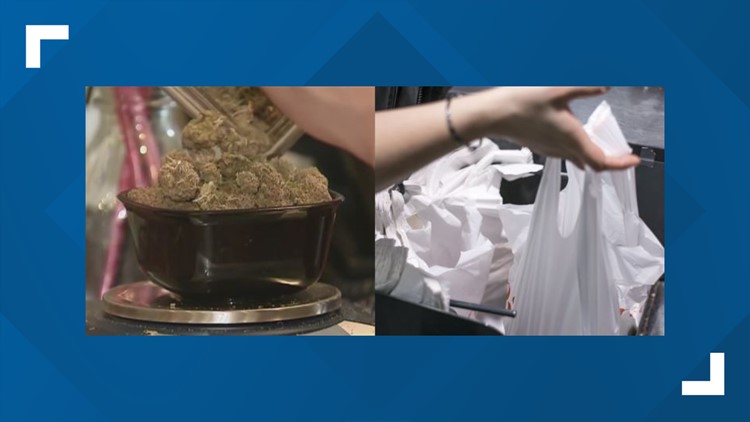CONNECTICUT, USA —
A host of new laws are scheduled to take effect Thursday. The most notable is a law that allows adults 21 and older to legally possess small quantities of marijuana. It marks the first step in Connecticut’s move toward a legalized system. It’s likely going to take at least a year before an industry is up and running. Other new laws that take effect on July 1 run the gamut, from expanded access to birth certificates for adoptees to the creation of a new 22-member commission that will study any disparate impacts of the COVID-19 pandemic.
Here are some of the new laws. You can see a full list here
Single-Use Plastic Bag Ban
The plastic bag fee, which came into effect August 1 2019, ends July 1. It is replaced by a ban on the use of single-use plastic bags by Connecticut retailers.
Single-use plastic bags are defined as bags with a thickness of less than four mils that are provided by a store to a customer at the point of sale. This does not include paper bags, reusable (four mils or thicker) plastic bags, laundry or dry-cleaning bags, newspaper bags or the thin plastic bags on a continuous, perforated roll that are used for sanitary reasons, like containing meat, seafood, loose produce or other unwrapped food items.
The former single-use bag fee applied statewide at a rate of $0.10 per plastic bag and was required to be collected by retailers making sales in Connecticut. The implementation of the fee itself will end on June 30, 2021, where retailers will no longer have to collect it as of July 1, 2021.
However, retailers must report and cancel fees collected through June 30, 2021.
Any retailer that improperly collects or any customer who mistakenly pays the plastic bag fee after June 30, 2021 is eligible to seek a refund from the DRS.
With the single-use ban, stores can continue to use other bags, like paper bags or reusable bags. However, if a store sells a paper or reusable bag, these sales are still taxable.
It’s important to note that some towns and municipalities have passed their own plastic bag bans previously, Westport being one. If a city or town’s ban is more restrictive than the state law, that still stands. If not, they must comply with the state bag sanctions.
End to Eviction Moratorium
Connecticut’s temporary ban on evictions also ends July 1, meaning that landlords can begin new eviction cases against tenants starting the first.
However, the CDC moratorium on evictions is in place until July 31, 2021. Federal guidelines must be met to qualify.
Qualification depends on tenant’s inability to pay full rent or other housing payments because they have lost income or have very expensive medical bills. To receive this protection, tenants must read and sign the CDC declaration, give it to their landlord, and keep all documentation and communications that prove they meet these requirements.
Recreational Cannabis Law
Connecticut’s bill on marijuana, called “An Act Concerning Responsible and Equitable Regulation of Adult-use Cannabis,” also goes into effect on July 1.
This bill involves the legalization of cannabis use and possession for adults 21 years old and over. In terms of possession, it cannot exceed one and one-half ounces of cannabis and five ounces of cannabis plant material in a locked container at such person's residence or a locked glove box or trunk of such person's motor vehicle.
The bill also sets regulations for cannabis dispensaries, delivery services and new regulations regarding smoking areas. There are also new penalties for individuals found with over the approved amount of cannabis on their person.
Black and Latino studies in public schools
This act requires all local and regional boards of education to include African-American and black studies and Puerto Rican and Latino studies in their curriculum beginning with the 2021-22 school year. It also adds these studies to the state’s preexisting required program of study for all public schools.
The State Board of Education is required to make curriculum materials available to help boards develop programs for these studies, as well as review and approve black and Latino studies high school courses for the State Education Resource Center to develop. This must be done by January 1, 2021. These courses must be offered in the 2022-23 school year, but may also be implemented in the 2021-22 school year.
School Climates
This act both modifies the definition of bullying, including eliminating the requirement that the action occur between students. It also introduces new rules for schools involving contacting parents in instances of bullying and introducing new trainings on bullying prevention and intervention.
Police Accountability
Several new provisions for the Police Accountability Act passed last year take effect, including provisions about liability in lawsuits.
Deceptive advertising practices of limited services pregnancy centers
This act states that no limited services pregnancy center, such as pop up clinics, with the intent to perform a pregnancy-related service, can spread print or online information about their services that is any way deceptive of what the services involve.
"Tristan's Law", requiring safety measures on ice cream trucks
The bill is meant to protect children in the course of buying ice cream from frozen dessert trucks by increasing the truck's visibility to other drivers, warning drivers that children may be present and limiting the location and conditions for vending.
The legislation was named after 10-year-old Tristan Barhorst, of Wallingford who was hit and killed by a car in Cheshire last summer after buying ice cream.
These regulations include, but are not limited to:
Vehicles stopping ten feet from the front or rear of a frozen dessert truck when the flashing lights signaling a stop are on before passing the truck at a speed of five miles per hour or less and yielding to pedestrians.
Trucks having signal arms on the front and rear, flashing signal lights, and a convex mirror to prevent blind spots.
Access to original birth certificates by adult adoptees
According to this act, an original certificate of birth may only be issued if the person named in the certificate of birth is deceased and the person seeking to obtain such certificate of birth is an authorized applicant.
Additionally, the registrar of vital statistics of the municipality of an adopted person's birth can issue an uncertified copy of an original birth certificate to the authorized applicant if the person named in the certificate of birth is deceased and each birth parent named on the original birth certificate consents, or consents to the release of identifying information, or is deceased or a legal representative or guardian consents to the release of identifying information on behalf of the birth parent.
Online gaming
This act states that any participant in online casino gaming, retail and online sports wagering, fantasy contests, Keno and online sale of lottery tickets by way of a native tribe-owned company must be on reservation land when conducting betting or entering fees for fantasy contests.
It also includes new regulations regarding master wagering licenses for tribes and the operation of gaming and betting within the state.
16-year-olds can operate amusement park rides
As of this act, 16-year-olds can operate rides at amusement parks if an adult who is least eighteen years old and trained in normal operating and emergency procedures supervises the area.
Jennifer's Law
Adds coercive control to the definition of domestic violence as well as put child safety as a priority in custody cases by making domestic violence the first factor to consider, a lawmaker said.
Regulation of alcohol-infused foods and self-automated pour systems
As of July 1, this act states that the commissioner must approve the sale of alcohol-infused foods that contain no more than one-half of one per cent of alcohol by weight and will adopt new regulations regarding their sale.
Additionally, authorized self-pour automated systems must be operated by a 21-year-old person and cannot dispense a serving of more than 32 ounces of beer, thirty-two ounces of cider that is 6% alcohol by volume or under or 10 ounces of wine before payment is made and permitted by the operator.
Strengthening the bill of rights for long-term care residents
Residents are entitled to treat their living quarters as their home and have no fewer rights than any other resident of the state. This includes associating and communicating privately with persons of the patient's choice and purchasing and using technology of the patient's choice.
Residents have the right to private communications and visits, as well as the right to present grievances and recommend changes in policies, procedures and services to the manager or staff of the nursing home facility without restraint, interference, coercion, discrimination or reprisal.
HERE ARE MORE WAYS TO GET FOX61 NEWS
Download the FOX61 News APP
iTunes: Click here to download
Google Play: Click here to download
Stream Live on ROKU: Add the channel from the ROKU store or by searching FOX61.



